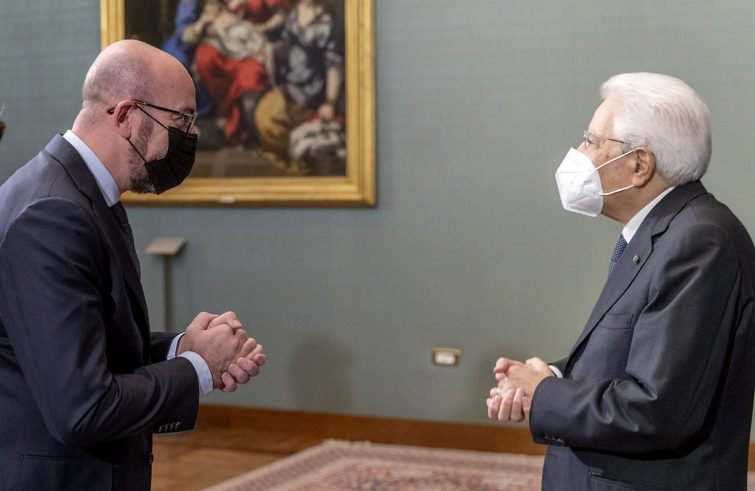
It is virtually a given: when a Head of State of a EU member country is elected or re-elected, institutional representatives in Brussels and Strasbourg send their congratulations and best wishes for the high office. But the re-election of Sergio Mattarella as President of the Italian Republic elicited a deluge of messages from EU dignitaries, along with just as many congratulatory remarks from heads of State and Prime Ministers from all over Europe and beyond. “Congratulations to Sergio Mattarella for his re-election as President of Italy. I firmly believe that Italy will continue its constructive contribution to the growth of the EU”, stated Charles Michel, President of the European Council. His words were promptly echoed by Roberta Metsola, new President of the European Parliament:
“Italy has always been and will continue to be a driving force within the European Union.”
Ursula von der Leyen, President of the Commission, wrote in a message: “Dear President Mattarella, congratulations on your re-election as President of the Italian Republic. Italy can always count on the EU.”
Josep Borrell, High Representative for European Foreign Policy, took it a step further: “The re-election of Sergio Mattarella is wonderful news for Italy and for Europe. President Mattarella is a man of dialogue, a staunch pro-European, sensitive to the rights of the last, loved by Italians, listened to and respected all over the world.”
European Commissioner Paolo Gentiloni made an explicit political analysis: “Thank you President Mattarella. Your decision is one of great responsibility against chaos and for the common good. Italy is stronger in Europe and in the world. And now onwards with the Draghi government.”
“My congratulations to Italian President Sergio Mattarella on being elected to serve a second term. He has dedicated much of his life to public service and the re-election bears testimony to the important role he has played in Italy during these years”, tweeted ECB President Christine Lagarde .
Amidst gratitude and praise, Europe is actually letting out a sigh of relief.
Over the past few days, a worried mood pervaded the Brussels headquarters, whilst half-uttered remarks were exchanged about the prospective decisions of Italian lawmakers. Hence there was a widespread feeling of anticipation in the Europarliament, the Commission and Council over the outcome of the vote that would determine the new president of Italy. Political consensus in favour of Mattarella therefore emerged as the best possible option for Italy and for Europe as a whole.
This was confirmed by the many heartfelt statements from various European capitals. Indeed – although Italians sometimes find it hard to believe – Europe is counting on Rome. Notwithstanding its domestic political instability and massive public debt, Italy is nevertheless perceived as a cornerstone of European integration, together with Germany and France. And not even its rickety governmental phases- at times accompanied by sovereignist overtones and uncertainties in its economic and foreign policies – have weakened Italy’s strategic role on the European stage.
That is why Mattarella’s re-election as President of Italy and Mario Draghi’s confirmation Prime Minister are a sign of stability also for the other 26 EU Member States.
The European Union is confronted with some major challenges: ranging from the pandemic to a much needed economic recovery, from Russian military pressure on its external borders to migration flows, without forgetting the drifts of some EU countries in terms of the rule of law or the risk of an energy blackout. Therefore, Italy’s constructive, solid, ‘thoughtful’ role in the institutional stability of the Union, towards the growth of a more modern and solid political integration, cannot but be awaited with open arms.
Italy, its politicians, its citizens, its industries and its civil society have yet to confirm the ‘European vocation’ that has shaped its history since the time of De Gasperi. Mattarella’s re-election is a fundamental step – not expected and indeed not sufficient – towards a vision of Europe and the future of the nation.









